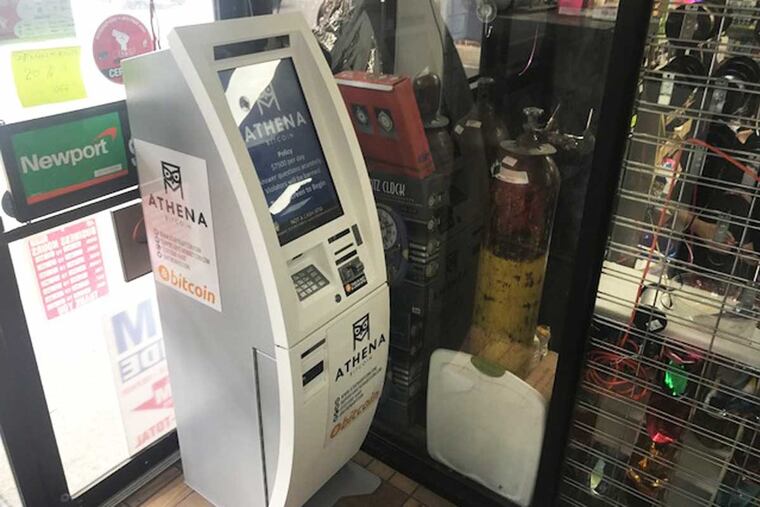Bitcoin ATMs invade Philly, taking cryptocurrency to the masses
About two dozen machines or shops in the region will take regular cash and credit private bitcoin accounts, according to a website that tracks such machines.

There's no shortage of bitcoin in Philadelphia.
In Northern Liberties, the red-hot digital currency can be bought at a shipping services storefront. In West Philadelphia, customers can fill their virtual wallets after topping off their tanks at a Citgo gas station. And in Cheltenham Township, a bitcoin ATM will convert your cash to cryptocurrency at a Dollar Plus variety store, conveniently sandwiched between an Aldi supermarket and a pawn shop.
About two dozen machines or shops in the region will take regular cash and credit private bitcoin accounts, according to the website CoinATMRadar.com, which locates and maps bitcoin ATMs. Those accounts can then be used to pay for goods online without a credit card, remit payments quickly to family overseas, or cover bets placed on online gambling sites.
They can also be used to buy illicit drugs over the Internet, according to federal agents with Homeland Security Investigations.
And the number of those bitcoin outlets appears to be growing. That should come as no surprise because the value of bitcoin has skyrocketed. In January 2015, the value of a single "coin" was about $220. In mid-May it spiked to more than $3,000. On Monday evening, one bitcoin was trading comfortably at about $2,860.
Hedge funds have swept in to gamble on the digital currency. Celebrities and athletes, from Bollywood movie stars to boxer Floyd Mayweather Jr., have promoted cryptocurrency, pumping up popular interest across the globe.
"There's a lot of excitement about it," said Kevin Werbach, a Wharton School professor who studies bitcoin and its underlying technology, called blockchain. "It's a commodity, and demand is exceeding supply.
"The magnitude of the rise this year has been a speculative bubble which will in time deflate," Werbach said. "but how fast and how far we don't know."
The world's dominant digital currency (there are more than 700), bitcoin operates independently of any government or bank. Transactions are recorded and verified on the blockchain database that is instantly shared on a worldwide network of computers. Industry analysts say that the technology underlying those transactions makes bitcoin more secure than using a credit card.
At Liberty Parcel, on the 800 block of North Second Street, a bitcoin ATM has been sitting inside the shop's entrance for more than a year, where it simply occupies space. "It's like a gumball machine in front of a pizza shop," said a clerk who did not want to be identified by name.
An average machine might exchange between $25,000 and $30,000 a month, said Neil Conner, a spokesman for Lamassu, a New Hampshire-based producer of bitcoin machines. Typically, stores where they are placed collect about $100 a month in rent.
Legitimate businesses accept bitcoin, most famously Microsoft (though only for games, movies, and apps in the Windows and Xbox stores) along with merchants on Etsy (an online marketplace for crafts) and Overstock.com. Some political action committees will accept donations in bitcoin.
Most bitcoin is traded on exchanges such as Coinbase and Poloniex, online operations that match buyers and sellers. The exchanges, which typically charge a 2 percent fee, are strictly regulated by federal and state agencies and follow the same rules as banks. Their clients include high-end investors, financial institutions, and speculators and have caught the attention of the U.S. Securities & Exchange Commission, which last week announced it wants to regulate some transactions.
Bitcoin ATMs generally serve a less sophisticated clientele, according to industry experts. The machines charge steep fees – up to 12 percent – and rarely require more than a cellphone number to establish an identity. Bitcoin ATM companies have moved aggressively into areas that are underserved by banks.
Because they require so little identification, the ATMs frequently are used to buy bitcoin for "nefarious reasons," according to federal agents. Most notoriously, bitcoin is the currency of choice on the dark web, where it's used to buy illicit narcotics. It's also used to extract payments from ransomware victims.
"Because this is a private, decentralized currency, bitcoin itself has no way of telling if you're buying a bag of potato chips with it or a kilo of drugs," said Werbach, the Wharton professor.
Lamassu's Conner said the bitcoin ATM machines allow new customers an easy way to experience the digital currency.
"If you're looking to get your feet wet in cryptocurrency, bitcoin ATMs are the easiest on-ramp," Conner said. "Whether it's $5 or $100, it's the least confusing way of getting involved."